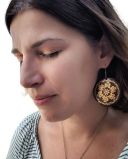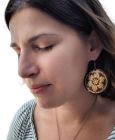Trust
Rhetorical Questions and Real Answers About Vaccination
Reflections on the Third Act of the Pandemic: The Jab
Posted April 26, 2021 Reviewed by Matt Huston
Key points
- Decision making in the face of uncertainty is complex.
- Using a risk-benefit framework is an effective means of making decisions in the face of uncertainty.
- What we know so far about vaccination indicates that its benefits outweigh its risks.
I hope this will be my last post on the pandemic. Not because it is “over,” but because the advice I have to offer is unlikely to be updated beyond this reflection.
This weekend I got my second vaccine dose. I felt fine afterwards, and even got to work on addressing my “quarantine 15 (pounds)” with a run the next day. In a few weeks, I am looking forward to eating inside a restaurant for the first time in over a year. I will order an appetizer, wine, and dessert—and when I am done I will not have to wash the dishes. It will be decadent.
I joined about 3 million other Americans in getting a dose that day, including about 1.5 million getting their first dose. That over 40 percent of Americans have gotten at least one shot already, only four months since the first vaccine was approved, is a medical miracle. Why do I use such flowery language? Because of how confusing and frustrating the vaccine rollout has been. The media keeps reporting on “softening demand” for the vaccine, but let’s be real: There is a special breed of person who is willing to camp outside Best Buy starting at 3 a.m. the day after Thanksgiving to get a deal on a TV and deal with a mob, and then there is the vast majority of people who want a TV but don’t want to sleep on a sidewalk to get one.
Every state had to submit their own “plan” for how they were going to roll out the vaccine this fall, and in my estimation, those plans were graded on a “participation award” scale. At least here in Michigan, prior to the past 10 days, if you wanted to get a vaccine it meant checking multiple websites, multiple times a day, in hopes of finding an appointment. Most sites had no ability to be added to a waitlist. And when you did get an appointment, it meant driving a long distance—most people I know drove about an hour each way—to get the jab. I am not surprised that more Americans weren’t chomping at the bit to get into that circus.

Yes, there is about 20 percent of Americans who are pretty hesitant about vaccination (a group that spans the political spectrum). If you are in that 20 percent, I encourage you to talk to people you trust—healthcare providers, pastors, family, and friends about those concerns. In the meantime, let me try to answer some of the (rhetorical) questions you may be asking yourself.
For example, if you feel that the vaccine was “rushed,” ask yourself: Under what circumstances would you feel that the vaccine pace was appropriate? That is, how long would it have taken for you to not feel it was “rushed?" One year? Two years? A decade?
If you don’t have a clear answer to that, then maybe your concern is really about the “emergency” nature of the FDA authorization. Do you have a clear idea of what “emergency” means in this situation? I certainly didn’t, but I looked it up and now I know that it means a) there is a serious health threat, b) there is a product that may be effective at addressing that threat, c) “the known and potential benefits of the product, when used to diagnose, prevent, or treat the identified disease or condition, outweigh the known and potential risks of the product,” and d) there is no alternative to address the threat. Seems reasonable, and I’m glad the FDA can grant such authorizations during crises like the one we are in now.
Still feeling unsure? Well, when the FDA approves the first vaccine fully (which will likely happen within the next month or so), will that convince you of its safety and efficacy? If not, why not? Does this mean you don’t trust the FDA as a whole? If so, why not?
I’m not an advocate of blind trust in any institution—government, private business, non-profits, etc.—but I am an advocate of realism. If there is literally no evidence that would convince you that the vaccine is safe and effective—that you are better off with it than without it—then your issue likely isn’t just with the vaccine, but with the entire practice of medicine and scientific research. That's a big pill to swallow (metaphorically, of course).
If you say you need “more data” to feel comfortable with the vaccine, ask yourself: How much data did you require the last time your doctor prescribed you antibiotics for an infection? Or advised you to start taking statins for your high cholesterol?
You can pore over the factsheets for these vaccines (akin to the advertisements for drugs you see in magazines), but if you are like me, the answer is "next to none," even though I have the quantitative chops to drill down into studies and data if I wanted to. That is, I trusted them that they had my best interest in mind when they gave me that advice or wrote me that prescription.
Do I read about the risks and benefits of any treatment I consider taking? Of course, and sometimes I even read the original studies. But do I demand evidence that does not and cannot yet exist—like, “Will the COVID vaccine protect me for more than six months? What if there are side effects from the vaccine that only emerge years later?”—when not enough time has passed for us to even begin to answer those questions? No.
Now, I understand why these questions feel compelling: they feel persuasive because the truth is “We don’t know...” But here’s the second half of that truth that I ask you to keep in mind: “...but what we know so far indicates that the benefits of vaccination far outweigh the risks.”
Every decision has risks and benefits—even the decision to not get vaccinated has the mental benefit of “not being told what to do.” But that benefit won’t end the pandemic any sooner, it won’t reduce the risk of you inadvertently infecting your loved ones with the virus, it won’t comfort you if you are unlucky enough to get infected and require hospitalization (which will involve you being alone, with your family unable to visit you), and it won’t reduce your risk of dying from this virus to nearly zero. All of those are benefits that you can expect from vaccination.

If you don’t have a healthcare professional in your life that you trust, I suggest you fire the ones you have and find someone who works better for you—not just for the vaccine, but for all your healthcare needs. And by healthcare professional, I don’t mean a “wellness” coach or someone trying to sell you oils, crystals, or something else. I mean a person that you trust with your health, the most important asset you have.
People who have been through a health crisis—whether cancer, a stroke, a heart attack, or a serious accident—know the true value of that asset, how quickly it can shift from minor troubles to a life-threatening emergency, and how no one gets through that kind of crisis alone. And the same is true for this collective crisis.




